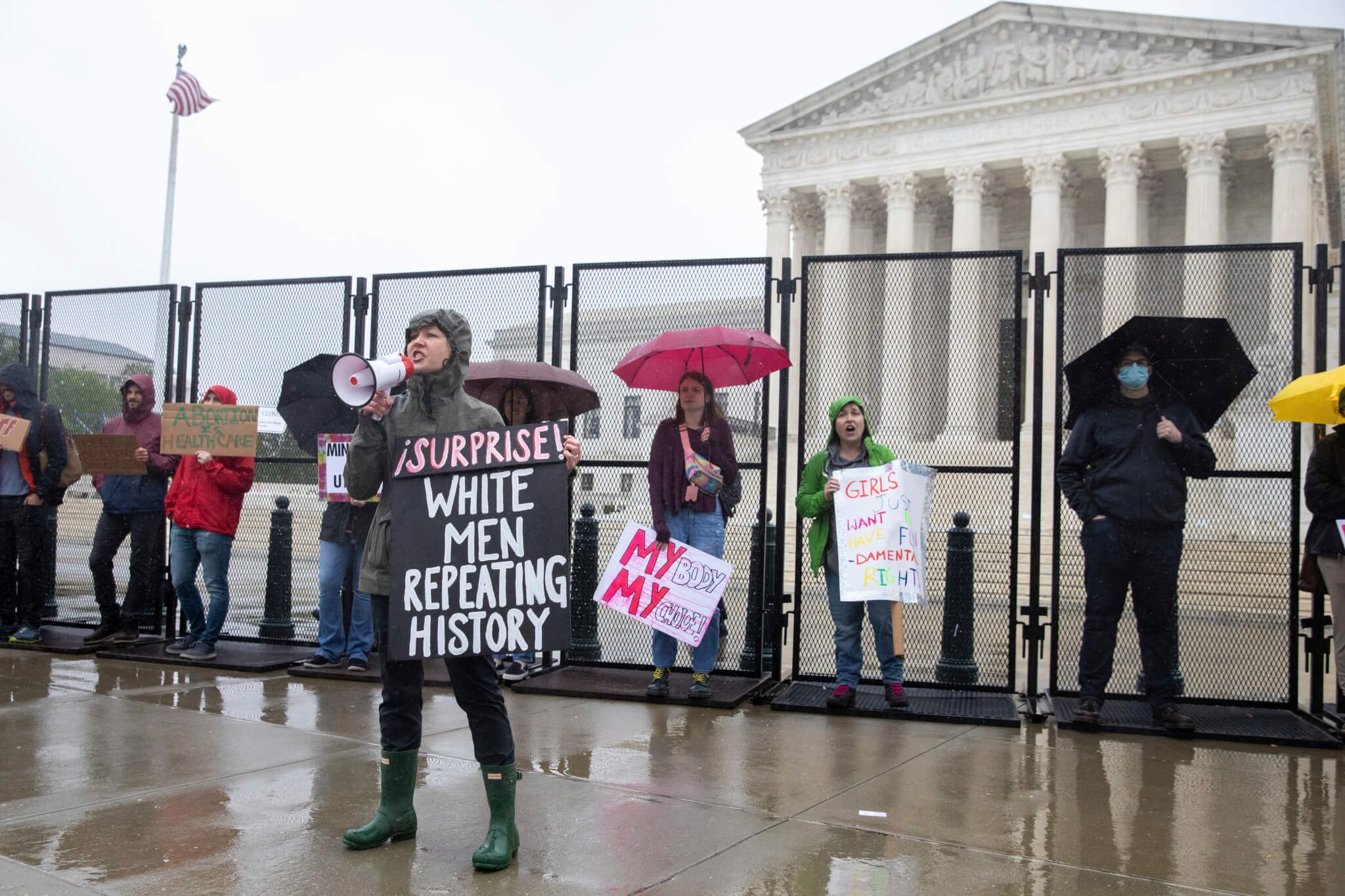
Abortion-rights protester Trish Manzke speaks into a bullhorn during a protest outside of the U.S. Supreme Court, Saturday, May 7, 2022, in Washington. A draft opinion suggests the U.S. Supreme Court could be poised to overturn the landmark 1973 Roe v. Wade case that legalized abortion nationwide, according to a Politico report released Monday. Whatever the outcome, the Politico report represents an extremely rare breach of the court's secretive deliberation process, and on a case of surpassing importance. (AP Photo/Amanda Andrade-Rhoades)
This is an update to this piece, originally published in January.
It seemed like the debate in Virginia about reproductive rights was over after Virginia’s Democratic lawmakers in the General Assembly defeated anti-abortion legislation, putting the issue to rest before the legislative session ended on March 12.
As the debate around the potential fall of Roe v. Wade continues, thanks to Politico’s reporting on a leaked draft opinion, reproductive rights have once again become a widely-discussed topic in the commonwealth.
Many lawmakers throughout the commonwealth have already expressed their feelings on the draft leak.
On Wednesday, the US Senate failed to pass a procedural vote on a motion to consider the abortion bill that would codify Roe v. Wade, with a vote of 49-51. To pass through to an additional vote to go on and codify the landmark Supreme Court decision nationally, the bill needed 60 votes. Senators Tim Kaine and Mark Warner were among the 49 yes votes, and they have both reaffirmed that they are in support of protecting reproductive rights and a woman’s right to choose.
For the time being, abortion is still safe and legal in Virginia, and will continue to be legal, even if Roe v. Wade is overturned. If it gets overturned, advocates across the commonwealth, including Planned Parenthood Advocates of Virginia (PPAV), will continue working hard to ensure abortion remains legal for years to come.
Jamie Lockhart, PPAV’s executive director, said that the future of abortion in Virginia depends on the elected officials serving the commonwealth in Richmond, because “the right to a safe, legal abortion is really hanging on by a thread.”
In the past, there were “unnecessary obstacles” to getting an abortion, such as a 24-hour waiting period, biased counseling, and mandatory ultrasounds. Those obstacles were repealed during the 2020 legislative session, but they could easily be reinstated should Virginia’s Senate become Republican-led.
“We are just one state senate seat away from abortion bans, like the one in Mississippi, getting to Governor [Glenn] Youngkin’s desk,” Lockhart said.
Democratic State Senator Joe Morrissey could be the vote that seals the future of abortion in Virginia, because his views on abortion and reproductive rights align more closely with his Republican colleagues. In an interview with The Virginia Mercury, he said “I am a moderate who tries to bring consensus to this. While I’m personally opposed to abortion, I believe the woman’s decision should be made after consulting with her doctor, her partner, and perhaps her spiritual adviser. I don’t think women should be jailed for having an abortion.”
Despite that, he has also expressed support for considering limits on abortion around the 20-week mark, which is similar to what Gov. Youngkin has proposed.
Despite Morrissey’s views, Lockhart reiterated the fact that there is a legislative process lawmakers have to adhere to.
“Bills still have to go through a committee process. There were abortion bans that were proposed this [past] legislative session, and those were stopped in committee,” she said. “The Senate Education and Health [Committee] and the Senate Rules Committee both blocked abortion bans or restrictions from getting to the Senate floor, so Sen. Morrissey did not have an opportunity to vote on any anti-abortion bills this past session.”
Trigger Bans
There are currently 13 states in the country that have trigger bans ready to go if Roe v. Wade is outlawed, that would immediately restrict and/or outlaw abortion in their states. If enacted, those bans could go into effect immediately, or within a month’s time after the decision has been handed down. There are 26 other states that PPAV advocates have estimated are likely to ban abortion soon after a decision is made, leading to a situation where some states have access, while other states don’t, such as neighboring states Tennessee, Kentucky, and West Virginia.
For states like North Carolina, that decision is up in the air, because it all depends on who ends up in office. Despite the fact that N.C. has had a pro-reproductive rights governor [Gov. Roy Cooper] who has vetoed abortion bans and restrictions, there is a Republican majority in both the N.C. State House and the N.C. State Senate.
“We know a lot of states in the South and Midwest will be moving quickly to ban abortion access, and so it’s really going to depend on what happens in Florida; what happens in North Carolina, and then kind of what the ultimate Supreme Court decision is,” Lockhart said.
In states like Texas, which has had a ban on abortions after six weeks, the future of abortion and reproductive rights has already started to play out on a national scale since the ban took effect in September.
“People in Texas who did not have the financial resources and support they needed to travel out of state have been forced to carry pregnancies [to term] or seek [an] abortion outside of [the] health care system,” she said.
What About Contraceptives?
After Justice Samuel Alito’s written draft leaked, lawmakers across the country started to voice their opinions on whether or not long-acting reversible contraception (LARC) methods, Plan B, and even The Pill, which has been a safe, effective form of contraception since it was first approved in 1963, should be banned or limited.
“We’ve seen anti-abortion, Republican leaders in other states indicate some appetite for attacking contraceptives,” Lockhart said, adding that she’s also seen on social media confusion on what Plan B is, as well as other forms of contraceptives including LARCs like an intrauterine device (IUD) or an implant.
“It will require Virginians to make their voices heard so that something like that is not even something that legislators in Virginia would consider,” she said.
Lockhart thinks that there’s an “overall lack of knowledge on sexual and reproductive healthcare” that’s contributed to the rise in confusion.
“We’re seeing people who have been talking about their views without the actual understanding of how healthcare works. Now they’re being caught in their misunderstanding of how sexual and reproductive healthcare works,” she said. “We’ve seen a lot of men talking about these issues, who have never been pregnant [and] cannot become pregnant.”
The Rise of the Crisis Pregnancy Center
If Roe v. Wade is overturned, there’s a very real possibility that more crisis pregnancy centers (CPC) could pop up across the commonwealth. It’s something Lockhart has worried about, especially in states where abortion is already highly restricted. CPCs have been known to deceive people, because many women don’t realize what the centers actually are, until it’s too late. She noted that the American Medical Association has called CPCs “unethical.”
“I hope people get the information that they need and deserve by going to sites like AbortionFinder and Planned Parenthood to get comprehensive information about their options,” she said.
In many cases, CPCs don’t have licensed healthcare providers, even though they try to market themselves as if they do.
“Oftentimes, they’re giving a drugstore pregnancy test [to patrons] and providing an ultrasound. They’re not, in the majority of cases, clinicians providing that care.”
It’s not unusual to find a CPC in close proximity to a legitimate women’s health care center, which can also be very misleading for people who are extremely vulnerable, especially in college towns.
“They often set up right next to health providers that provide abortion care to further deceive people in the hopes that people will walk into the wrong location,” Lockhart said.
Ultimately, the future of abortion and reproductive rights in Virginia is still up in the air. State bans, like ones in Oklahoma and Texas, have already shown what the future could look like across the country, especially since some lawmakers, like Senate Minority Leader Mitch McConnell, have even entertained the idea of a national abortion ban.
“It’s devastating right now for people not to get the healthcare that they need and deserve. The vast majority of Americans, as well as the vast majority of Virginians, don’t want politicians making those decisions. They want decisions about pregnancy to be between the pregnant person and their medical provider, their family, their faith leader, and others that are important to them, who they love and trust,” Lockhart said.
She’s hopeful that Americans will fight back, and we won’t reach a point where there is a national ban. She also knows that the road to regaining full reproductive rights isn’t going to happen overnight, and that electing people to office who want to protect reproductive rights is important.
“We’re in a different place than we were pre-1973. Abortion pills are incredibly safe and effective. I think people know that there will be harm from blocking access to essential healthcare.”

VIDEO: Your support matters!
Your support matters! Donate today. @vadogwoodnews Your support matters! Visit our link in bio to donate today. #virginianews #virginia #community...

Op-Ed: Virginia’s new Democratic majorities pass key bills to improve your lives, but will Youngkin sign them?
The 2024 Virginia General Assembly regular session has wrapped up. It was a peculiar session from the outset, with Democratic majorities in the...

Op-Ed: Why Virginia Needs A Constitutional Amendment Protecting Reproductive Freedom
Virginia’s recent election season in 2023 drew in eyes from all over the country. Reproductive freedom was on the line and Virginia remained the...

From the state rock to the state flower, here’s how Virginia got its symbols
Have you ever wondered why the Dogwood is the state flower? Or how the cardinal became the state bird? We’re here to answer those questions and more...

VIDEO: Second-gentleman Douglas Emhoff gives speech on reproductive freedom
Second gentleman, Douglas Emhoff touched on reproductive freedom not only being a woman's issue but "an everyone's issue" during the Biden-Harris...

Glenn Youngkin and the terrible, horrible, no good, very bad night
Election Day 2023 has come and gone, and while there are votes to be counted, one thing is perfectly clear: Virginians unequivocally rejected Gov....





